
Winning Orders, Raising Cash, and the Oval Office
Jeff Foust, Senior Staff Writer, SpaceNews, moderated the Satellite Manufacturers session which examined satellite production, winning orders, raising cash, IRIS2 and potential geopolitical problems out of the U.S.
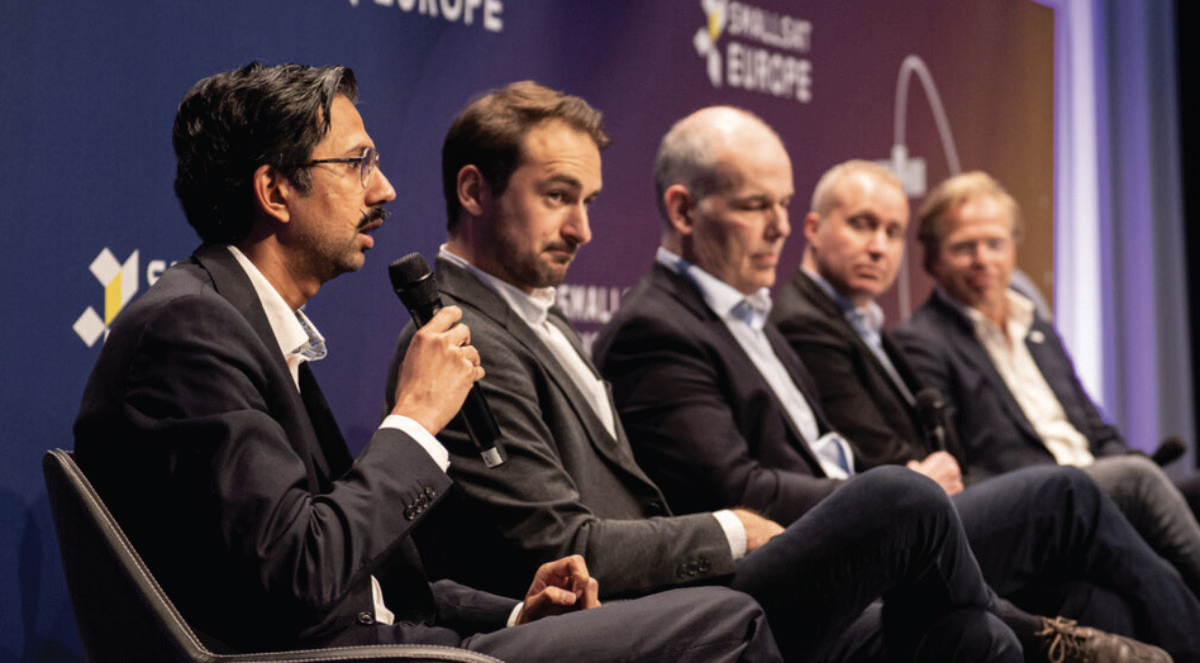
Simon van den Dries (Head of Business Development, Space Services, Endurosat) said that while funding was generally coming from government, it was important that local offices were maintained in European countries.
Dr. Thomas Sinn (CEO & Founder, Dcubed) said he sensed there was more funding coming from governments but was extremely worried about Washington’s tariff structure.
Luis Gomes (CEO, AAC Clyde Space) told all his firm’s growing portfolio spans Earth Observation, communications and navigation and supports real-world applications across multiple sectors.
Gregoire Nemo (Snr. Manager, Aerospacelab Inc.) stated the company was recently been selected by JAXA for its SAMRAI project, marking a significant milestone in satellite platform collaboration.
Dr. Sethu Suvanam (CEO & Founder, ReOrbit) reported the company is experiencing broader partnerships within the industry.
IRIS2 was very much a topic at the sessionindeed over the two days of the event. Read more...
VC, PE and Other Funding Opportunities
Noel Rimalovski (Managing Director, New York-based GH Partners) asked panelists how they viewed the current financial market (better, worse, much the same) compared with 2024. He also polled a question to delegates as to whether there would be significant cross-Atlantic investment activity this year, and 69% of respondents said ‘No’.
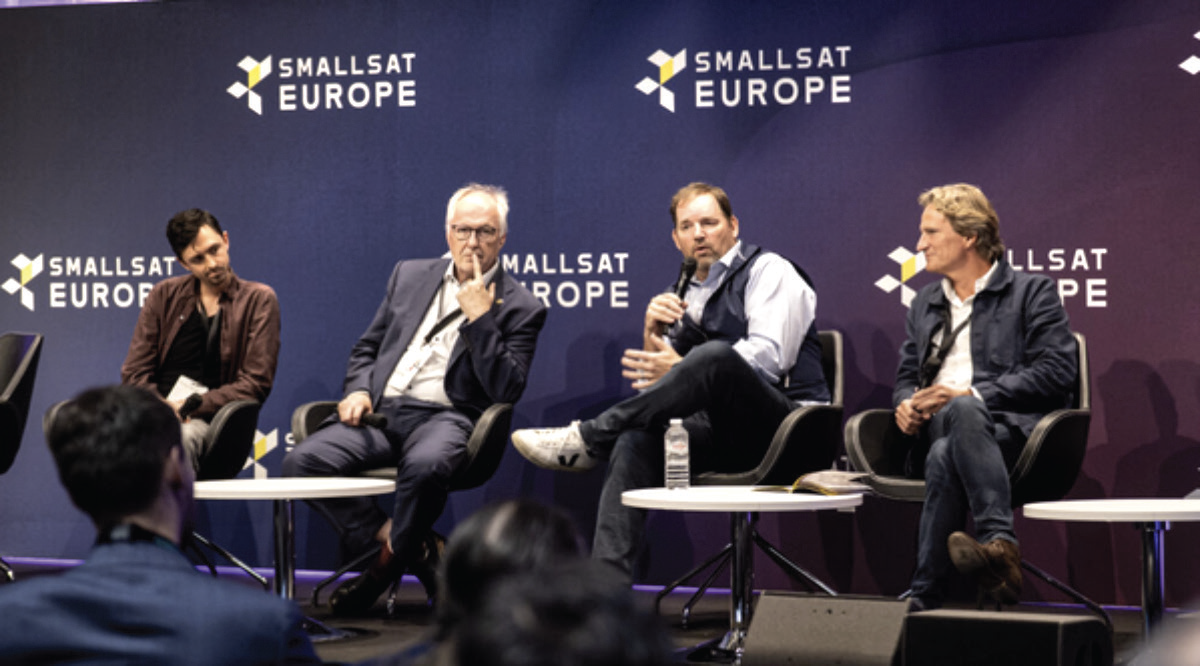
Sven Meyer-Brunswick (Principal, Alpine Space Ventures) said he loved the science stuff, but was concentrating on space as an industry. This is what drives growth, he said, and cash needed to be deployed where operators and nations were under threat and where critical infrastructure was involved. He was also pessimistic about Europe’s mega-project IRIS2 and said, in his view, the scheme was “dead in the water.”
Daniel Biedermann (Investment Partner, at Luxembourg-based NewSpace Capital) suggested that looking at any potential company there needed to be a comprehensive understanding—by the business—of developing the market, growing the business, and the potential for business maturity. The recent activities out of Washington now puts a number of extra hurdles to be overcome and businesses will have to decide whether they want to make those moves. However, if your target market is in the U.S., then you have no option except to clear and hire U.S. security cleared staff, for example.
Mike Collett (Managing Partner, Promus Ventures) explained that their investment strategy was not limited to Europe or the U.S. or elsewhere, but whether the business was capable of growth. Rocket Lab was one such perfect example. Collett said that the Trump administration had now placed a number of barriers into the mix as regards to cross-Atlantic activity. However, we are now seeing companies saying they do not want to go to the U.S. He also stressed that while the IPO window was largely closed, the fact was that AI was sucking the air out of the market.
Charles Beigbeder (General Partner, Expansion) said some aspects were true cross-overs and Earth Observation was very useful in climate change and was also valuable to other end-users, including the military. The good news from the Oval Office over the past few months is the move in Europe that indicates they want European autonomy—“But they will still go to the U.S. because the market demands it.”
The panel agreed that the next few years would see consolidation in Europe, whether from private Launch providers, or Earth Observation data analysis. Beigbeder suggested that Europe’s 15 or so rocket launch companies would end up being just 3 or 4 within a year or two—excluding Arianespace. Read more
AI and the Explosion in Data Handling
Moderator Ahsun Murad (Cofounder, President and CEO, Optimal Satcom) and introduced his panel saying that, while there was a great deal of hype in AI, there was also a great deal of promise.
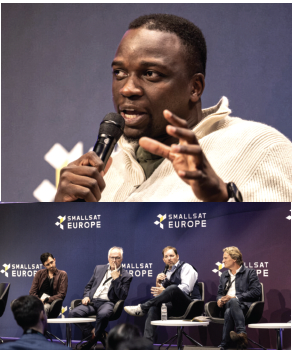
Rama Afullo (Founder and CEO, Satlyt) was especially excited by the prospects of using GenAI in orbital satellites and that AI was also very useful in predictive analytics.
Milos Krasojevic (Manager of Product Management for GPU systems, Supermicro). He told delegates that first the data needed to be generated, and then interpreting that data via AI and training AI to further improve the results.
Alessandro Benetton (CTO, AIKO told delegates that AIKO was already using AI to extract data from satellites and AI has the benefit of removing or reducing bottlenecks on the satellite.
Alan Campbell (Principal Space Products Solutions Architect, Amazon Web Services – AWS) highlighted that his customers were collecting several Terabytes of data per day and where generative AI models were already being applied to deliver new insights in flood damage or wildfire assessment.
Robert Blamire (Senior Manager, Accenture) stated that whenever you are dealing with rich data stream, AI was increasingly crucial to the efficient use of a satellite. Read more..
Eutelsat: OneWeb and Beyond
Jean-Hubert Lenotte (Director Strategies & Resources, Eutelsat) said there is significant growth in our industry. The cost of capacity, ten years ago, was €5 million per gigabit. Now it is barely €1 million. That reduction in cost will continue and this will open up new opportunities. This will continue.
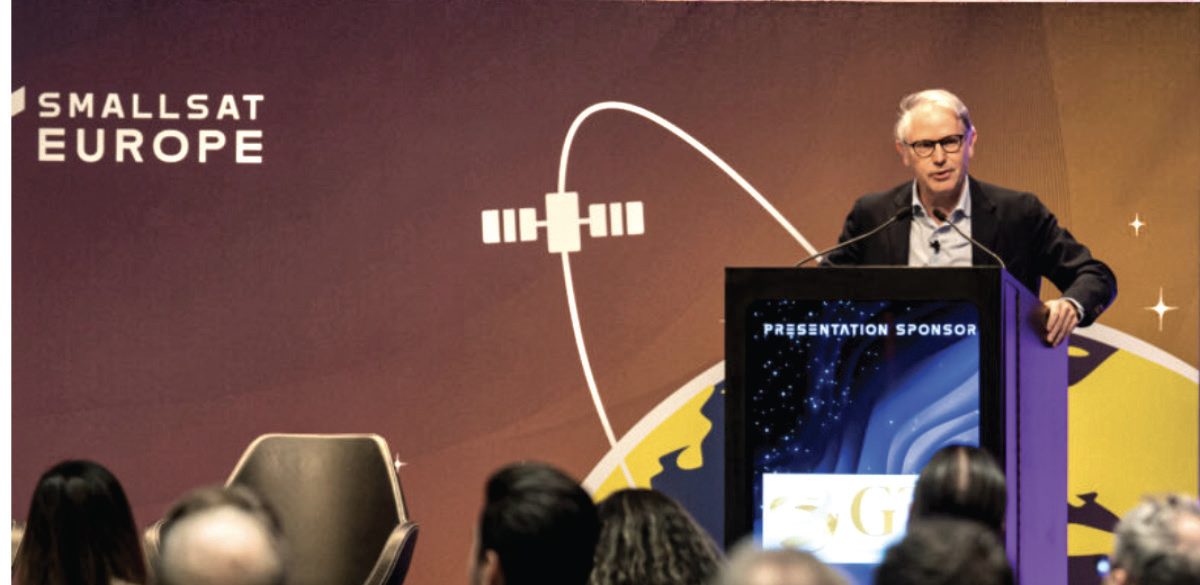
We firmly believe there will only be a few players in this market. We see 2 or 3 in Ku, and 2 or 3 in Ka-band. What is not easy is the establishment of a true global service, including the Earth stations, plus connectivity, is not easy. Sending the satellites up into orbit is, in many regards, the easier part of the task.
Lenotte explained that Eutelsat’s OneWeb division was already supporting B2B clients, as well as crucial help to Ukraine and that IRIS2 would add to Eutelsat’s bandwidth. Read more..
Consolidation and Avoiding the “Deep, dark desert of disruption and despair”
Moderated by Alexis Sáinz, Partner at Hogan Lovells, he said back in 2023 there was a wave of consolidation, citing the AeroVironment $4.1 billion acquisition of Blue Halo last year as a good case in point and praised the action as an excellent fit.
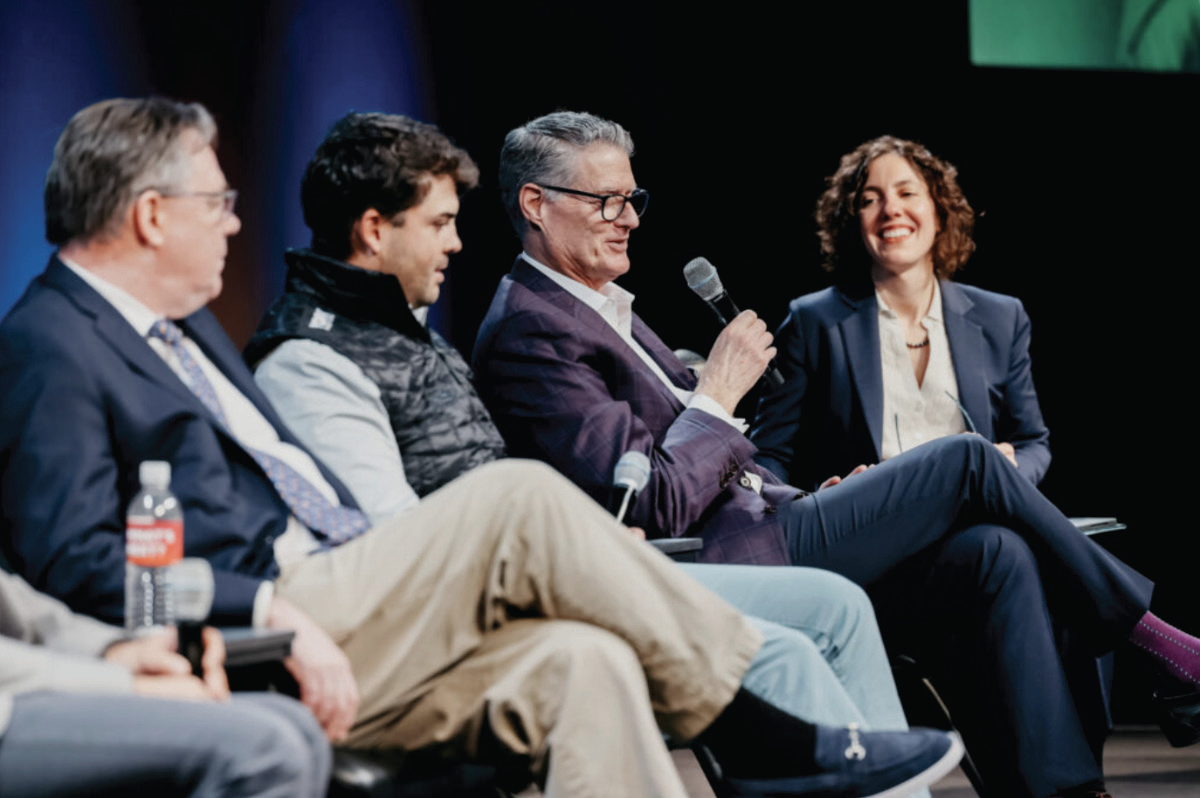
Armand Musey, Financial & Valuation Consultant, Summit Ridge Group, said recently they were focusing on D-2-D, FSS and ground equipment, however, he said he was pessimistic. He expected European consolidation to happen once governments decide what they want to do with both satellite manufacturing and launch.
Karl Schmidt, MD, KuippsDeSanto & Co., said that of last year’s deals in aerospace and defense ,about 15% of them involved space or space related activity. In 2025 we would expect space components to again figure with similar percentages.
Tyler Letarte, Principal, AE Industrial Partners, said that 2024 was notable in the number of deals that did not get done.
Akshay Patel, MD at PJT Partners, said he was spending a lot of time in the smallsat area.
“My view is that a lot of activity last year was dependent on Space Development Agency (SDA) work and awards. Many of these companies have SDA revenues in their own pipelines. Those SDA timelines are somewhat delayed and this has created ripple effects down the line.
“For 2025 it remains a guessing game. Tranche 3 awards are beginning to flow, but we also have a new Administration and it is unclear as to which path will be taken. Vertical integration can be expensive.”
Read more...
EO and Climate Change: From Deep Space to Mission Impossible
Peter de Selding (Co-Founder & Chief Editor, Space Intel Report) said that EO was a crucial task for smaller satellites.
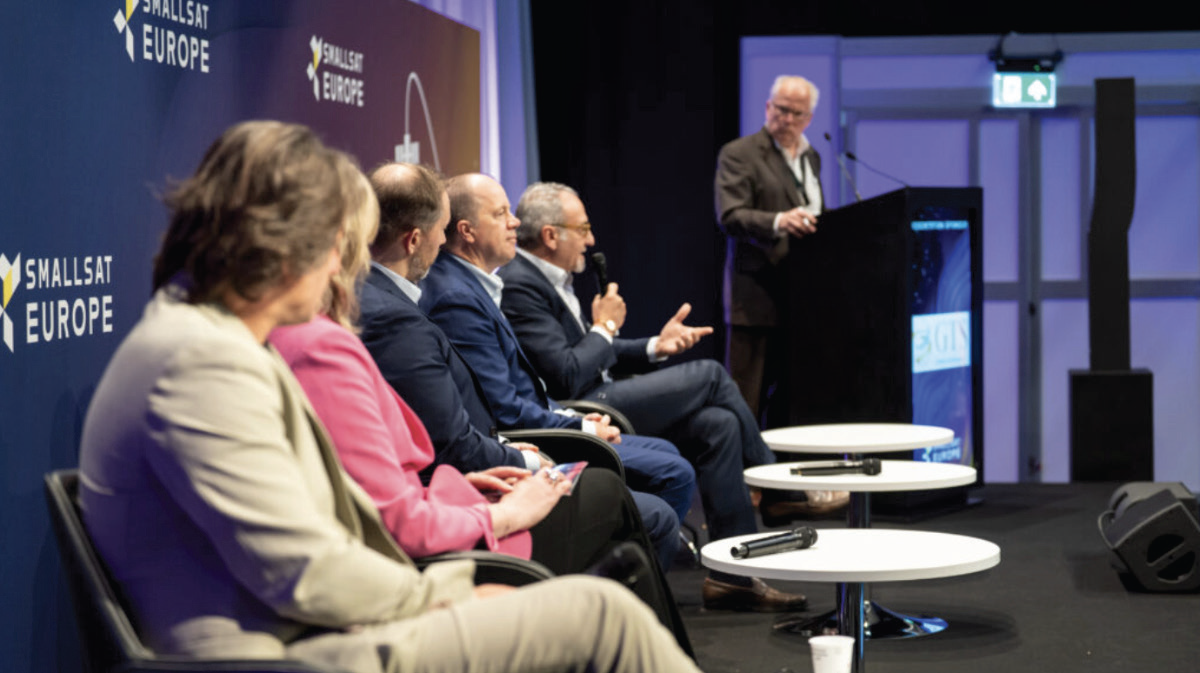
Dr. Malcolm Davidson, Head of the Campaigns Section in the Earth and Mission Sciences Division, ESA told delegates that his department was handling a variety of EO projects and included Copernicus and its long-term mission.
Andrea Vena, Chief Climate and Sustainability Officer ESA, said ESA wanted to be role-model for the industry as a whole, especially in terms of sustainability and as part of the ESA’s Green Agenda.
Jarkko Antila (CEO, Kuva Space Oy) is very much in EO and is targeting 100 satellite to be in orbit by the end of this decade, giving business an ‘always on’ view of a client’s demand..
Nina Soleng (Head of Communications, KSAT) told delegates that climate change in the Arctic was happening 4xs faster than the planet in general.
Dr. Marco Esposito (Managing Director, cosine Remote Sensing) said his core business was working with Australia using cosine’s equipment for monitoring landslides, floods and related events.
Read more...
Can Europe Fund Mega-Constellations?
Tom Stroup (President, Satellite Industry Association, SIA) asked his panel to examine whether Europe was ready with its own constellations.
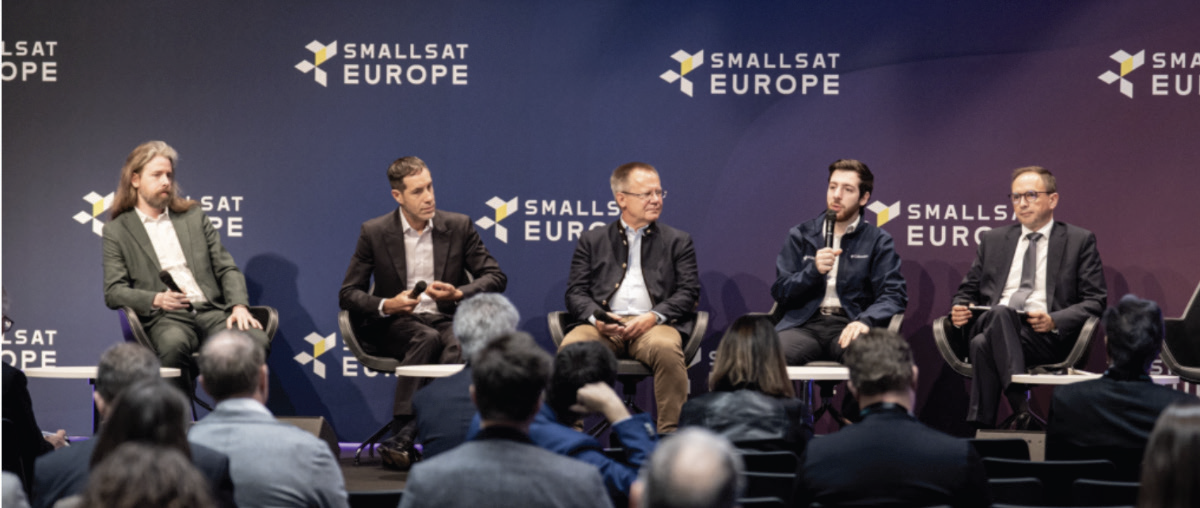
Dallas Kasaboski (Principal Analyst, Analysys Mason) said that there were more than 200 constellations planned but not all will happen, adding the market cannot absorb 50 major developments.
Renato Panesi (Co-Founder and CCO, D-Orbit) told delegates there is better access to funding in Europe, whether for Series A or B funding, with some projects getting simple start-up funding from ESA.
Dr. Martin Haunschild (Business Development Manager Space/Institutional Affairs, Mynaric AG) said that Europe already has independence from the U.S. through Galileo.
Julian Fernandez (CEO, FOSSA Systems) explained that Europe had plenty of talent, and cash and there are also capital efficiencies by working in Europe and that one key advantage in Europe was in the Defense sector.
Laurent Jaffart (Director of Connectivity and Secure Communications, ESA) told delegates that Europe certainly has the brains but maybe not the same cash available as SpaceX. Europe is at the beginning, and the beginning of something that will grow, version by version. He also warned that in Europe not all of the current names in the sector will survive. “Think about partnering, because there is not enough money to finance all of your ideas and projects.”
Read more

